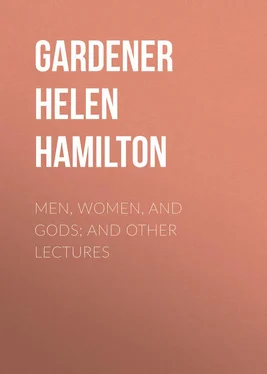Helen Gardener - Men, Women, and Gods; and Other Lectures
Здесь есть возможность читать онлайн «Helen Gardener - Men, Women, and Gods; and Other Lectures» — ознакомительный отрывок электронной книги совершенно бесплатно, а после прочтения отрывка купить полную версию. В некоторых случаях можно слушать аудио, скачать через торрент в формате fb2 и присутствует краткое содержание. Жанр: foreign_antique, foreign_prose, на английском языке. Описание произведения, (предисловие) а так же отзывы посетителей доступны на портале библиотеки ЛибКат.
- Название:Men, Women, and Gods; and Other Lectures
- Автор:
- Жанр:
- Год:неизвестен
- ISBN:нет данных
- Рейтинг книги:3 / 5. Голосов: 1
-
Избранное:Добавить в избранное
- Отзывы:
-
Ваша оценка:
- 60
- 1
- 2
- 3
- 4
- 5
Men, Women, and Gods; and Other Lectures: краткое содержание, описание и аннотация
Предлагаем к чтению аннотацию, описание, краткое содержание или предисловие (зависит от того, что написал сам автор книги «Men, Women, and Gods; and Other Lectures»). Если вы не нашли необходимую информацию о книге — напишите в комментариях, мы постараемся отыскать её.
Men, Women, and Gods; and Other Lectures — читать онлайн ознакомительный отрывок
Ниже представлен текст книги, разбитый по страницам. Система сохранения места последней прочитанной страницы, позволяет с удобством читать онлайн бесплатно книгу «Men, Women, and Gods; and Other Lectures», без необходимости каждый раз заново искать на чём Вы остановились. Поставьте закладку, и сможете в любой момент перейти на страницу, на которой закончили чтение.
Интервал:
Закладка:
I don't know how good this recipe is, but I should infer that it is a double-back-action affair of some sort that could get into a man's heart and lead him into salvation before he knew it, and that if the Church can just get a patent on that she is all right; otherwise I suspect that the goody-goody ones are likely to be about all she will get in large numbers.
Do I need any stronger, plainer evidence than this to show that the thought of the world is against it, and that it is time for women to ask themselves whether a faith that can hold its own only by its grasp upon the ignorance and credulity of children, a faith that has made four-fifths of the earnest men sceptics, a faith that has this deplorable effect upon Boston manners, is one that does honor to the intellect and judgment of the women of to-day?
We hear women express indignation that the law classes them with idiots and children; but from these orthodox statements it would seem that in the Church they voluntarily accept about this classification themselves. If only these church-people go to heaven, what a queer kindergarten it will be, to be sure, with only a few male voices to join in the choruses – and most of those tenor.
This religion and the Bible require of woman everything, and give her nothing. They ask her support and her love, and repay her with contempt and oppression. No wonder that four-fifths of the earnest men are against it, for it is not manly and it is not just; and such men are willing to free women from the ecclesiastical bondage that makes her responsible for all the ills of life, for all the pains of deed and creed, while it allows her no choice in their formation, no property in their fruition. Such men are outgrowing the petty jealousies and musty superstitions of narrow-minded dogmatists sufficiently to look upon the question not as one of personal preference, but as one of human justice. They do not ask, "Would I like to see woman do thus or thus?" but, "Have I a right to dictate the limit of her efforts or her energy?" – not, "Am I benefited by her ecclesiastical bondage and credulity? Does it give me unlimited power over her?" but, "Have I a right to keep in ignorance, have I a right to degrade, any human intellect?" And they have answered with equal dignity and impersonal judgment that it is the birthright of no human being to dominate or enslave another; that it is the just lot of no human being to be born subject to the arbitrary will or dictates of any living soul; and that it is, after all, as great an injustice to a man to make him a tyrant as it is to make him a slave.
Whenever a man rises high enough to leave his own personality out of the question, he has gone beyond the stage of silly platitudes. His own dignity is too secure, his title to respect too far beyond question, for him to need such little subterfuges to guard his position, either as husband, as household-king, or as public benefactor. His home life is not founded upon compulsory obedience; but is filled with the perfume of perfect trust, the fragrance of loving admiration and respect. It is the domestic tyrant, the egotistic mediocre, and the superstitious Church that are afraid for women to think, that fear to lose her as worshipper and serf.
You need go only a very little way back in history to learn that the Church decided that a woman who learned the alphabet overstepped all bounds of propriety, and that she would be wholly lost to shame who should so far forget her modesty as to become acquainted with the multiplication table.
And to-day, if she offers her opinion and her logic for what they are worth, the clergy preach doleful sermons about her losing her beautiful home character, about her innocence being gone, about their idea of her glorious exaltation as wife and mother being destroyed. Then they grow florid and exclaim that "man is after all subject to her, that he is born for the rugged path and she for the couch of flowers!" 1 1 "A pertinacious adversary, pushed to extremities, may say that husbands indeed are willing to be reasonable, and to make fair concessions to their partners without being compelled to it, but that wives are not; that if allowed any rights of their own, they will acknowledge no rights at all in any one else, and never will yield in anything, unless they can be compelled, by the man's mere authority, to yield in everything. This would have been said by many persons some generations ago, when satires on women were in vogue, and men thought it a clever thing to insult women for being what men made them. But it will be said by no one now who is worth replying to. It is not the doctrine of the present day that women are less susceptible of good feeling and consideration for those with whom they are united by the strongest ties, than men are. On the contrary, we are perpetually told that women are better than men by those who are totally opposed to treating them as if they were as good; so that the saying has passed into a piece of tiresome cant, intended to put a complimentary face upon an injury." – John Stuart Mill.
You recognize it all, I see. You seem to have heard it somewhere before. I recall one occasion when I heard it from a country clergyman, who knew so much about heaven and hell that he hardly had time to know enough about this world to enable him to keep out of the fire unless he was tied to a chair. It was in the summer of 1876, and I remember the conversation began by his asking a lady in the room about the Centennial display, from which she had just returned. He asked her if she would advise him to take his daughter. She said she thought it would be a very nice thing for the girl, and she added, "It will be good for you. You will see so much that is new and wonderful. It will be of use to you in your work, I am sure." He said, "Well, I don't know about that. There won't be anything much that is new to me. I've seen it all. I was in Philadelphia in 1840 ." Then he gave us quite a talk on "woman's sphere." He could tell you in five minutes just what it was; and the amount of information that man possessed about the next world was simply astonishing. He knew pretty nearly everything. I think he could tell you, within a fraction or two, just how much material it took to make wings for John the Baptist, and whether Paul sings bass or tenor. His presbytery says he is a most remarkable theologian – and I don't doubt it. According to the law of compensation, however, what he does not know about this world would make a very comprehensive encyclopedia.
But seriously, did it ever occur to you to ask any of these divine oracles why, if all these recent compliments are true about the superior beauty and virtue and truth and power resting with women – why it is that they always desire as heirs sons rather than daughters? You would think their whole desire would be for girls, and that, like Oliver Twist, their chief regret would be that they hadn't "more." But the Bible (and the clergy, until quite recently) pronounces it twice as great a crime to be the mother of a girl as to be the mother of a boy. A crime to be the mother of a little child – a double crime if the child should be a girl. 2 2 See Appendix K.
It is often urged that women are better off under the Christian than under any other religion; that our Bible is more just to her than other Bibles are. For the time we will grant this, and respectfully inquire – what does it prove? If it proves anything it is this – that all "divine revelations" are an indignity to women, and that they had better stick to nature. Nature may be exacting, but she is not partial. If it proves anything, it is that all religions have been made by men for men and through men. I do not contend for the superiority of other Bibles, I simply protest against the wrong in ours. One wrong cannot excuse another. That murder is worse than arson does not make a hero of the rascal who fires our homes. If Allah were more cruel than Jehovah, that would be no palliation of the awful crimes of the Old Testament. That slaves have better clothes than savages cannot make noble traffic in human blood. A choice of evils is often necessary, but it does not make either of them a good. But there is no book which tells of a more infamous monster than the Old Testament, with its Jehovah of murder and cruelty and revenge, unless it be the New Testament, which arms its God with hell, and extends his outrages throughout all eternity!
Читать дальшеИнтервал:
Закладка:
Похожие книги на «Men, Women, and Gods; and Other Lectures»
Представляем Вашему вниманию похожие книги на «Men, Women, and Gods; and Other Lectures» списком для выбора. Мы отобрали схожую по названию и смыслу литературу в надежде предоставить читателям больше вариантов отыскать новые, интересные, ещё непрочитанные произведения.
Обсуждение, отзывы о книге «Men, Women, and Gods; and Other Lectures» и просто собственные мнения читателей. Оставьте ваши комментарии, напишите, что Вы думаете о произведении, его смысле или главных героях. Укажите что конкретно понравилось, а что нет, и почему Вы так считаете.












